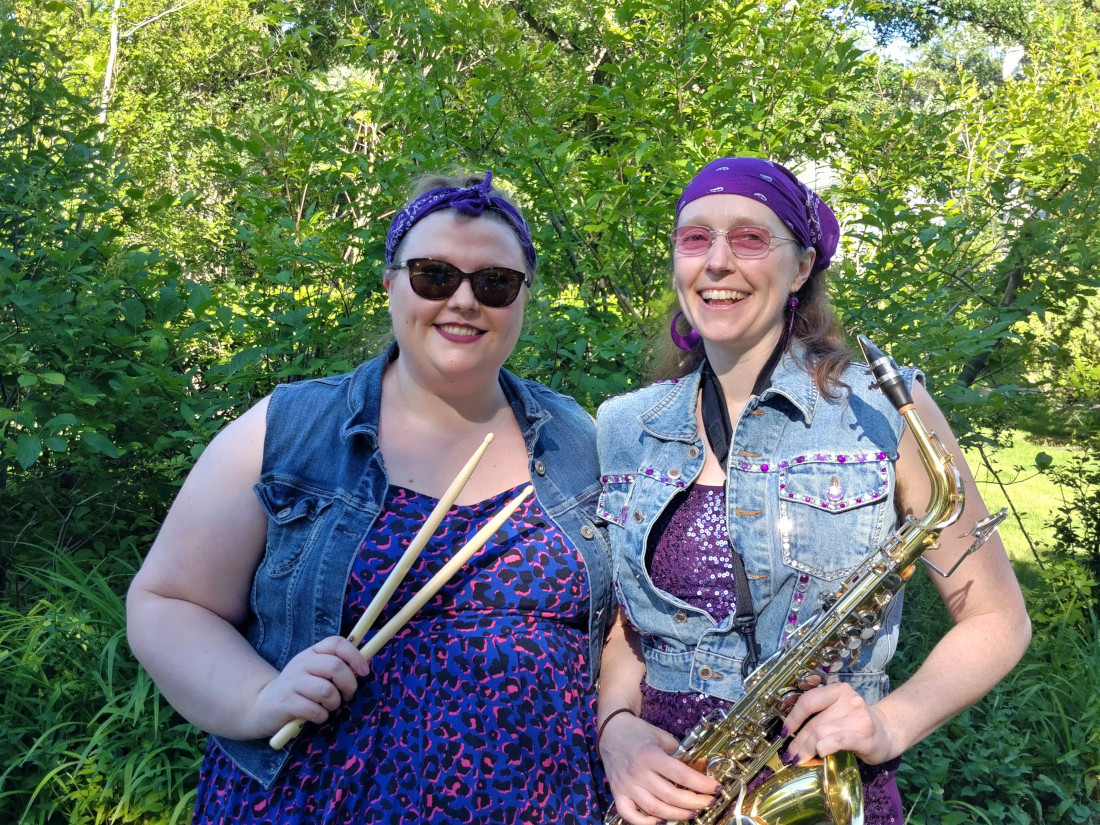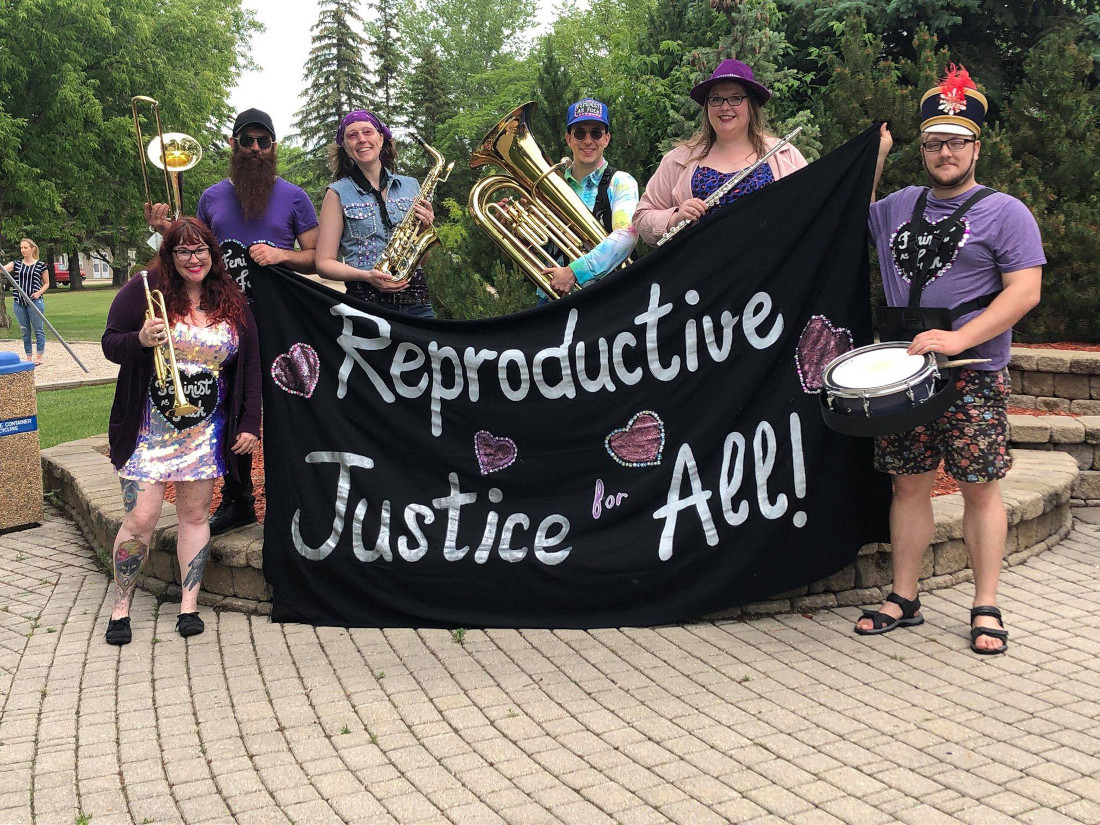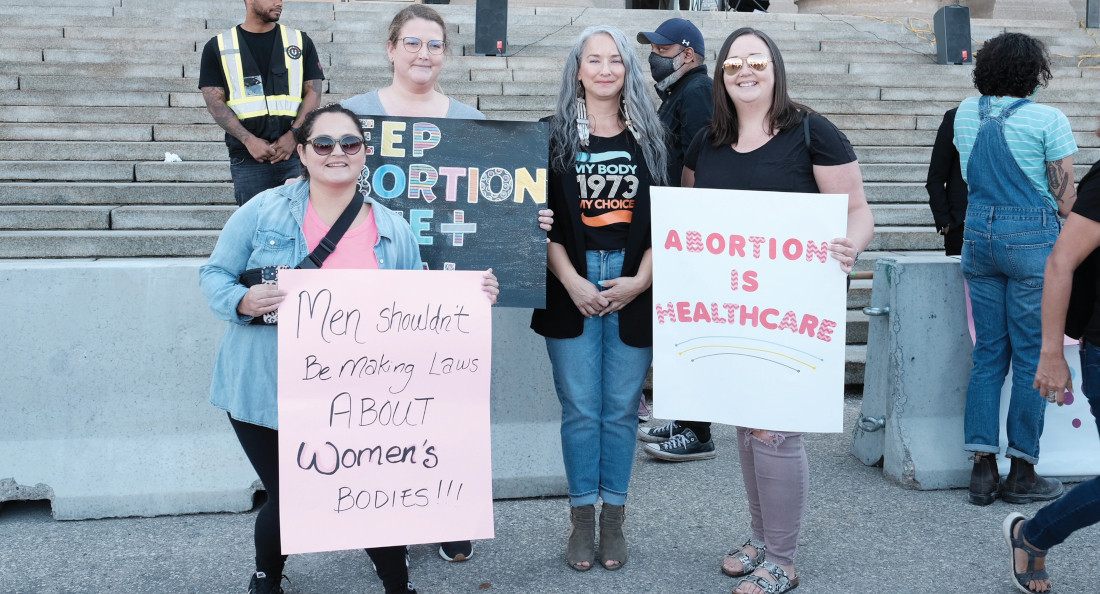Barriers to choice
Legislation continues to challenge Manitobans’ access to reproductive healthcare
On Oct. 2, 2021, a crowd gathered outside the Manitoba Legislative Building in solidarity with Texans impacted by a recent United States Supreme Court decision banning abortions after six weeks. This group, led by the Women’s March Winnipeg chapter, reminded Manitobans that reproductive justice in the province has a long way to go.
“I think the momentum (to fight back) was always there,” Blandine Tona, program director at the Women’s Health Clinic, says. Tona says the Texas law, which came into effect on Sept. 1, ultimately has nothing to do with making sure people don’t have abortions.
“It’s making sure that people don’t have safe abortions, because people will have abortions,” she says.
Abortion laws in Canada have been inconsistent, first allowed under limited circumstances in 1969. Perhaps most famous is the 1988 R. v. Morgentaler case in which the Supreme Court of Canada ruled anti-abortion legislation as unconstitutional. This effectively removed any law restricting abortions, treating abortion like any other medical procedure. Attempts to pass anti-choice legislation have continued since then.
Mifegymiso, a drug that induces chemical abortion, was approved by Health Canada in 2015 and became available to the public in 2017. The Manitoba provincial government announced universal coverage of the drug in 2019.
The introduction of Mifegymiso would make abortion access easier for people living in remote communities – theoretically.
Accessing reproductive healthcare
The Women’s Health Clinic (WHC) is one of four centres in Manitoba that offers abortion. The centre opened in 1981 when abortion was still a crime in Canada and provides access to reproductive healthcare for people with uteruses.
Tona says the WHC offers a variety of services and options when it comes to abortion specifically. “
You can decide what you want to do with your pregnancy,” Tona says. “We see you. We want to know how we can meet your needs and how we can help you.”
Tona says people in remote communities often have to set aside two to three days for a visit to the WHC for their abortion, due to travel time. This is expensive and unnecessary, when many pregnancies could more easily be terminated within a person’s community, but the training is not mandatory for all midwives and doctors practicing within the province.

The Feminist as Fuck marching band found a creative solution to countering anti-choice protesters: drown them out with music! (supplied photo)
“Our reproductive health infrastructure still has a long way to go,” NDP MLA Nahanni Fontaine says. Fontaine organized the Oct. 2 rally alongside the Women’s March Winnipeg chapter.
Mifegymiso, which can be used up to nine weeks into a pregnancy, is less invasive, easier to access and more discreet to take. It also helps avoid unnecessary travel.
“Pills can be shipped anywhere,” Fontaine says.
Tona says the WHC mails pills to remote communities. Ideally, dispensing would happen within a community, but the related training is not enforced.
“Well, what if you’re a doctor and you don’t believe in abortion? Well then, you don’t sign up for that training ... those northern communities, because of that, don’t have access to Mifegymiso,” Fontaine says.
Fontaine says a potential solution would be to broaden the scope of who can dispense the drug to nurses and midwives and suggests partnering with pharmacies to have a wider distribution.
“We still have a long way to go, and what I find tragic is that Mifegymiso is a gamechanger in respect of having control over one’s reproductive health, but yet there’s still barriers in doing so,” Fontaine says.
Another barrier to accessing reproductive healthcare is the cost.
“Many places today don’t fund free birth control,” Tona says. “So, it’s just the privilege that people who can afford it or (whose insurance covers it) can have access to birth control.”
There is a lack of education, Tona says, both for the individuals and professionals involved. Many people don’t know their options when it comes to abortions and other reproductive services.
“People who want to have an abortion, like any other health services, need to be able to have access to that. And they need to have access to something that is affordable or free like any other health service, something that is dignified – because health should be dignified,” Tona says.
Part of the issue is that the provincial government does not take reproductive healthcare seriously, Tona says. A succession of health ministers have repeatedly delegated abortions to the status of women ministry.
“You have a minister of health who has refused to say abortion is healthcare; who has refused to take women’s health as part of healthcare; who has refused to identify reproductive health of people with uteruses as part of health,” Tona says.
The message Manitobans are getting from the government is that “this part of your body is not important. It’s not healthcare. It’s not human rights,” Tona says.
The Abortion Protest Buffer Zone Act
Adding to the physical and financial barriers in accessing reproductive healthcare in Manitoba is the more personal issue of antichoice protestors who picket outside centres with abortion access, such as the HSC Winnipeg Women’s Hospital and the WHC.
“Anti-choice protestors stand in the way of Manitobans being able to access, in a safe and responsible manner, healthcare,” Fontaine says, adding that not everyone who goes into one of these centres is there for an abortion.
Fontaine introduced Bill 207, the Abortion Protest Buffer Zone Act, in response to the anti-choice protests. Bill 207 was the third iteration of this bill, the first having been introduced in 2016 and the second in 2020.
The original 2016 version of the bill included only abortion centres but has since been expanded to cover schools as well, due to an experience Fontaine’s son had with antichoice protestors picketing outside his school.
Bill 207 was voted down in the House at the second reading on Oct. 14, 2021. The Progressive Conservative caucus cited the infringement on people’s freedom of speech as an issue with the bill.
“Having the right to freedom of speech does not mean a person has a right to say whatever they want, whenever they want, without consequence,” Lisa Naylor said in
the House during the same sitting.
“While protest activity is a sign of democratic health, the right to protest is not boundless ... These are reasonable limits to the right of free speech. And they help other important rights, such as the right to access healthcare.”
The “free speech” rationale is also a dubious, flimsy justification, given that bufferzone laws are already on the books in British Columbia, Newfoundland and Labrador, Quebec, Ontario, Alberta and Nova Scotia.
An interview request by The Uniter with the minister of health and seniors care was not returned.
“When you look at bills or legislation across the country and in different areas, like ... Australia and Europe, you know, those pieces of legislation at their heart are meant to protect citizens accessing healthcare. It doesn’t matter what healthcare you’re accessing,” Fontaine says.
“Those legislations are put in place to make sure that their citizens aren’t being harassed or intimidated or bullied or persuaded to access healthcare.”
After listening to a constituent talk about her experience and the difficulty she had recovering at the HSC Winnipeg Women’s Hospital due to the noise made by the protestors outside, Fontaine says that when she will resurrect the bill – either in November or the spring sitting – she will add a noise provision to the buffer zones.
“I don’t care if you agree with abortion or not. That’s neither here nor there for me. What I care about is Manitobans being able to access healthcare safely without being harassed or molested with, you know, gross imagery – gross erroneous imagery. That’s what I care about,” Fontaine says.
No room for debate
The Feminist as Fuck marching band (FAF) is a creative response to a lack of legislation around protests. The group, which also plays in support of other feminist and community causes, started in 2018 as a counter-protest to the anti-choice 40 Days for Life rally.
“We decided to bring our instruments to contribute to the noise. After that, a few friends loved the idea of making it a regular thing, and our band started growing,” Jacquie Nicholson, who started the marching band with her sister Kelsey, says.
Jacquie says anti-choice protestors “create this illusion that the abortion debate is still a debate.”
“Their movement, such as it is, really benefits from this idea that we can just keep debating the reproductive autonomy rights of women and gender-diverse people forever,” she says. “Abortion is a settled issue. It’s a medical procedure.”
The goal of the strategy employed by FAF is to prevent discussions.

The anti-choice movement “really benefits from this idea that we can just keep debating the reproductive autonomy rights of women and gender-diverse people forever ... Abortion is a settled issue. It’s a medical procedure.” - Jacquie Nicholson, Feminist as Fuck marching band member (supplied photo)
“We’re just kind of there to shut that down. It’s like, no, there’s actually like a really out-of-key marching band playing right now so, like, no dialogue can happen. It’s too loud,” Jacquie says.
The group chants enthusiastic slogans to get the crowd involved, such as “bodily autonomy, for you and you and me,” plus well-known songs such as “Louie Louie,” “Stand by Me” and “Seven Nation Army.”
Jacquie adds that it can be demoralizing to attend a counter-protest, especially for people who have personal history with the topic.
“It can feel really dispiriting and demoralizing, and even triggering or traumatizing for people. So we’re happy to be there with like *makes tuba noises* to try and bring some levity and help people feel empowered when they’re counter-protesting as well,” Jacquie says.
Kelsey says their presence at the 40 Days for Life counter-protest was “relatively successful.”
“We didn’t get to chase them off, unfortunately, but I think we did help to prevent them from actually talking to anyone,” she says.
The FAF marching band has also made music videos “in support of the Manitoba Nurses Union and RED for Ed Manitoba, a group of teachers organizing against Bill 64.”
“With the support of so many people around the province, we got that bill thrown out ... maybe our little march had something to do with that,” Kelsey, who is also a teacher, says.
This year, FAF has decided “not to aurally accost the anti-choicers at the 40 Days for Life vigil.”
“It feels unsafe to do so with the fourth wave of COVID upon us, and we don’t want to inadvertently contribute to the stress that healthcare workers are facing by noisily protesting outside a hospital,” Jacquie says in an email statement.
Instead, the group is running a fundraiser in support of Action Canada for Sexual Health and Rights, providing funds to “people who need to access abortion care but are facing financial barriers, such as high travel costs.”
Cheekily on-brand for the marching band, the goal of the fundraiser is to match the amount of anti-choice protestors who attended the Life Chain rally on Oct. 2 with a $25 donation each, totalling a $1,150 goal.
‘A long way to go’
Manitoba’s “reproductive health infrastructure still has a long way to go,” Fontaine says. “I really do try to encourage Manitobans to reach out to their MLAs to impart on them the need for government – for the PCs – to support legislation that makes accessing healthcare safe.”
Tona suggests several ways the provincial government can improve access to reproductive healthcare.
“First, making sure that those services are available everywhere. Secondly, funding birth control, access to birth control and also for birth-control counselling and pregnancy counselling,” Tona says.
Tona also calls for a revision of the sex-education curriculum.
“We need to start (with) safer sex education in school ... if we invest today into our young people, we give them opportunities to have safer choices, and, if not, if they made choices, to know that they do have access to services that are safer and dignified to them,” Tona says.
She says individuals can help by advocating on behalf of and donating to the WHC.
“What we need today is having people standing together and just sending the same and consistent message to the government, which is healthcare is a human right,” Tona says.
Published in Volume 76, Number 07 of The Uniter (October 28, 2021)







